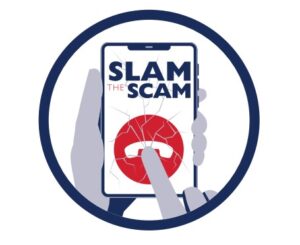Thursday, March 7th is National Slam the Scam Day.

Sadly, some individuals find it easier to scam unsuspecting people out of their hard-earned money rather than work honestly for it. In this blog, we will provide tools to help you recognize Social Security-related scams and explain what you should do to keep scammers from getting the best of you.
Did you know that in 2023 alone, the FTC reported over 2.4 million reports of fraud? This number is suspected to be on the lower side because not all people who have been scammed report it. Embarrassment, pride, and the stigma associated with being scammed are just a few reasons people are hesitant to report it.
One of the main ways of scamming is “Imposter Scams” (sometimes called impersonator scams). These extremely common scams take many different forms but essentially involve a criminal posing as someone you trust to steal your money. These criminals often pretend to be a government agency representative contacting you regarding Social Security, Medicare, or your taxes. The average financial loss per person is $995. For many people, especially those on a fixed income, this can be and usually is devastating.
HOW TO PROTECT AGAINST SCAMMERS

Education is key in staying aware and on guard against scammers. Here are a few ways to keep you and your finances safe from scammers:
- RECOGNIZE SCAMMERS. They tend to:
- PRETEND to be from an agency or organization you know.
- Say there is a PROBLEM with your account.
- PROMISE a prize.
- PRESSURE you to act immediately.
- Ask you to PAY in a specific way.
HOW TO AVOID A SCAM

- Remain calm and tell someone you trust.
- Hang up or ignore the message.
- Do not click on electronic links or attachments.
- Protect your money: Criminals will insist you pay with a hard-to-trace currency such as a gift card, prepaid credit or debit card, wire transfer, cryptocurrency, money transfer, or by mailing cash.
- Be skeptical of a contact you did not initiate.
- Above all, DO NOT SHARE any of your personal information, including your address, bank account numbers, credit or debit card numbers, and other financial information.
Knowledge is power. The more aware you are of how criminals may try to scam you, the more power you have to protect yourself and your hard-earned money. If you feel you have been a scam victim, contact the Social Security Office of the Inspector General (OIG) or visit ssa.gov/scam.
Parmele Law Firm is a Social Security Disability firm with over 135+ years of combined experience. We have helped over 55,000 individuals receive the Social Security benefits they so rightly deserved. If you are ready to begin your SSD claim, contact PLF at 866-889-2570 to schedule your no-cost consultation.
Parmele Law Firm. Guiding you with integrity, competency, and experience.
FAQ
National Slam the Scam Day is observed on Thursday, March 7th, 2024. It aims to raise awareness about scams and equip people with tools to recognize and combat them.
The FTC received over 2.4 million reports of fraud in 2023. However, it’s suspected that this number might be higher due to underreporting for various reasons.
People may hesitate to report being scammed due to reasons such as embarrassment, pride, and the stigma associated with falling victim to scams.
Imposter scams involve criminals posing as someone you trust, such as a government agency representative, to steal your money. These scams often target Social Security, Medicare, or tax-related issues.
The average financial loss per person in Imposter Scams is $995, which can be devastating for many, particularly those on fixed incomes.
Education is key in staying aware and on guard against scammers. Individuals should learn to recognize scammer tactics, remain skeptical of unexpected contacts, and avoid sharing personal information.
If you suspect a scam is targeting you, remain calm and tell someone you trust. You should also hang up or ignore the message, avoid clicking on electronic links or attachments, and refrain from sharing personal information.
Scammers often try to pressure victims into acting quickly by claiming there’s a problem with their account, promising a prize, or insisting on immediate payment.
Individuals should be wary of paying in ways that are hard to trace, such as with gift cards, prepaid credit or debit cards, wire transfers, cryptocurrency, money transfers, or by mailing cash.
If individuals believe they’ve been scammed, they can contact the Social Security Office of the Inspector General (OIG) or visit ssa.gov/scam for assistance and guidance.
